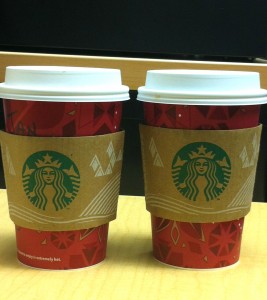This is where Starbucks comes in. I suspect that more business is conducted at Starbucks coffe shops than anywhere else. It’s sort of every small business owner’s “office away from home”–neutral networking territory. If you do the whole networking thing, certainly you’ve had the “Let’s meet for coffee” meeting.
Coffee meetings are safe. Generally you’re not billing for time at a Starbucks meeting. Being an accountant, I think some people are afraid to come to my office. They think that if they walk though my door I’ll put the meter on and start billing them. (I’m not that bad, really!)
Many small business owners don’t have offices, so Starbucks is a good place to hold a meeting. I know some small business owners who spend hours at Starbucks. For the price of a cup of coffee you also get a table to work at and an internet connection.
So, how do Starbucks coffee receipts fit into your tax return? I’ve got two ways:
- 1. You meet a business acquaintance for coffee and you pick up the tab for both of you. Keep track of the meeting and you easily meet the 50% deductible rule.
- 2. You meet a business acquaintance for coffee but you only pay for your own coffee. (This is pretty common.) You can still probably claim this as a business expense but you have to be a little more careful. There’s an old 1953 court case (Sutter v. Commissioner of Internal Revenue http://www.leagle.com/decision/195319121ttc170_1172) that states that you can’t deduct entertainment expenses just for yourself if you’re paying what you normally pay for something.
So — If you’re going to Starbucks everyday and picking up a latte whether you’ve got a meeting or not– that’s a normal expense for you so a Dutch Treat Starbucks coffee isn’t a deductible business expense for you.
On the other hand, if you’re not buying gourmet coffee unless you’re at a business meeting, then you’d be allowed to claim that expense. The whole key here is to document, document, document. For me–I pay a $30 fee to my office manager so that I may have coffee at work. At one cup a day, that works out to $1.50. At Starbucks, my coffee costs $4.50; so clearly, I’m not normally spending $4.50 on coffee unless I’m having a meeting.
Under the Sutter rules, I don’t have to subtract my normal coffee cost from what I spend, I can deduct 50% of the whole cost. I just have to be able to prove that my normal coffee cost is less than $4.50.
Does the IRS really go back to 1953 tax court cases when they audit returns? Yes, as a matter of fact, they do. Even though there have been significant changes to tax law since that case, Sutter is still invoked in audit cases with high entertainment expenses.
Personally, given how many people use Starbucks for their meeting rooms and internet connections, I think the IRS should allow a 100% deduction for Starbucks as a rent and computer expense. But don’t try that, it won’t fly with the IRS. The best you’ll get is a 50% deductible meals and entertainment expense.


